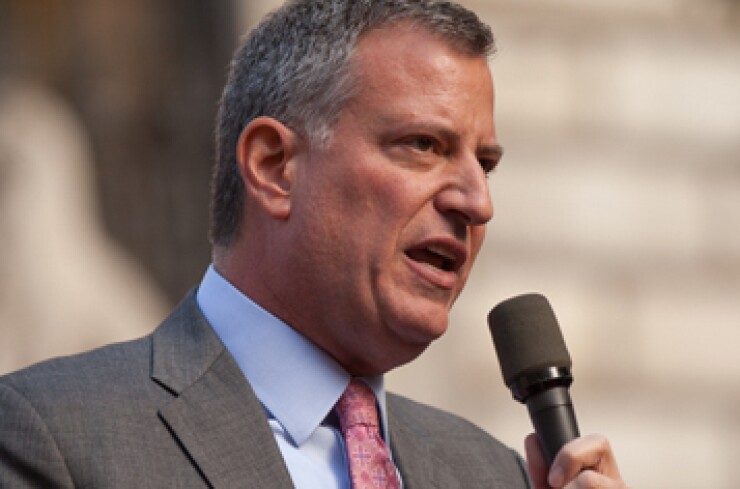
Mayor Bill de Blasio unveiled a 10-year plan to overhaul the New York City Housing Authority, calling the embattled agency's financial problems dire.
"This is, at this moment, the worst financial crisis in the history of NYCHA," de Blasio told reporters late Tuesday at the Johnson Houses in East Harlem.
NYCHA faces nearly $2.5 billion in cumulative projected operating deficits over the next decade and nearly $17 billion in unmet capital needs for major infrastructure repairs, de Blasio said while announcing his "
The plan includes 10,000 affordable housing units on underused NYCHA-owned property that he said would help jump-start his 10-year initiative to build and preserve 200,000 units of affordable housing.
NextGeneration NYCHA consists of several stages, said De Blasio.
Moves to enhance short-term financial stability and long-term funding diversity include city relief of NYCHA's payments in lieu of taxes, or PILOTS, already announced in the mayor's proposed $78.3 billion fiscal 2016 budget and $83.8 billion 10-year capital plan. This, he said, builds on the already-waived $70 million annual payment to the New York Police Department, to achieve an additional $30 million in operating savings per year.
To streamline operations, De Blasio called for the integration and attrition of 1,000 central office positions into other city services and agencies to save roughly $90 million in annual operating savings per year; and improving rent and fee collection to the tune of $30 million in revenue per year.
He also intends to lease more than 2 million square feet of non-residential ground floor spaces to achieve up to $1 million in operating revenue per year; and boost parking revenues — while capping resident parking rates at $150 per month maximum — by increasing occupancy and rates to achieve up to $5 million in operating revenues per year.
Longer-term goals, he said, include deploying $3 billion of funding from the Federal Emergency Management Agency to repair and protect more than 200 buildings that sustained significant damage from Hurricane Sandy, allocating $100 million per year for three years and calling on state matching funds for a comprehensive roof replacement program to reduce capital needs by $600 million.
For the first time, according to de Blasio, NYCHA will institute a capital planning process by analyzing the needs of the entire portfolio, rather than the current case-by-case basis, and prioritizing repairs and upgrades.
To leverage philanthropic funding, de Blasio will launch the Fund for Public Housing, a nonprofit 501(c)(3) organization to raise $200 million over three years to support linking NYCHA residents to third-party service providers to improve social service delivery.
"NYCHA has struggled with operating deficits in the last decade and continues to project deficits that grow to $194 million in 2019," the Citizens Budget Commission watchdog organization said in a
CBC cited insufficient and unreliable operating subsidies, noting that Congress consistently underfunded operating subsidies for public housing authorities, nationally the last decade. In addition, said CBC, obtaining federal support for units built by the City and State has proceeded more slowly than originally planned.
The CBC, however, also pointed to low non-rental income, low rent collections and high operating costs per unit.
On Friday, city Comptroller Scott Stringer and NYCHA chief executive Shola Olatoye announced a sweeping overhaul of the agency's inventory system, following the release of a Stringer
Stringer issued many reports critical of the agency while Manhattan borough president from 2006 through 2013.





